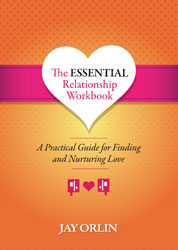Online Dating Scams
 |
| The Essential Relationship Workbook |
What really works and what is a waste of time? The odds of finding someone on the Internet who will truly be the partner of your dreams are greatly exaggerated. It is not an avenue to be ignored of course, but there has to be a strategy for it. It merits a minor investment of your time, modest expectations, and a lot of healthy skepticism. Remember the old saying, seeing is believing? All you see on the Internet is the tiny window of information people are willing to show. Remember, some people on the Internet are complete phonies (or worse), so use it with a healthy degree of caution and awareness.
The Wall Street Journal published an article (May 4, 2011) titled, “Is Dream Date a Scam?” It pointed out that even sophisticated people can be taken in by Internet dating scams.
There are people with integrity who use the Internet to look for a partner. In fact, most people approach it with honorable intentions. But a small minority of people (you don’t even know if they are really men or women) exploit the fervent desires of people who are looking for someone; people looking for love expose themselves to being vulnerable and can be easily tricked and manipulated.
The 2010 documentary film, Catfish exposes for the viewer how rampant deception and fraud are on the Internet. And this is particularly so with regard to people falsely representing themselves as someone who they are not.
Are Internet Dating Services Scams?
I will not go so far as to say that Internet dating firms are scams. I do however recommend that people understand that online dating is now a billion dollar industry. Many websites claim that they can help you find your “soulmate.” But do these online dating services live up to all the hype?
Not exactly, according to an article to be published in a forthcoming issue of Psychological Science in the Public Interest, a journal of the Association for Psychological Science.
In the article, a team of psychological scientists aims to get at the truth behind online dating, identifying the ways in which online dating may benefit or undermine singles’ romantic outcomes.
Lead author Eli Finkel, Associate Professor of Social Psychology at Northwestern University, recognizes that “online dating is a marvelous addition to the ways in which singles can meet potential romantic partners,” but he warns that “users need to be aware of its many pitfalls.”
Many online dating sites claim that they possess an exclusive formula, a so-called “matching algorithm,” that can match singles with partners who are especially compatible with them. But, after systematically reviewing the evidence, the authors conclude that such claims are unsubstantiated and likely false.
“To date, there is no compelling evidence that any online dating matching algorithm actually works,” Finkel observes. “If dating sites want to claim that their matching algorithm is scientifically valid, they need to adhere to the standards of science, which is something they have uniformly failed to do. In fact, our report concludes that it is unlikely that their algorithms can work, even in principle, given the limitations of the sorts of matching procedures that these sites use.”
My intention here is neither to frighten you nor to discourage you from using Social Media as part of your search for a partner. I do want to strongly encourage you to have realistic expectations, allot your time wisely, and to maintain a healthy skepticism – especially when an opportunity comes along that seems unbelievable.